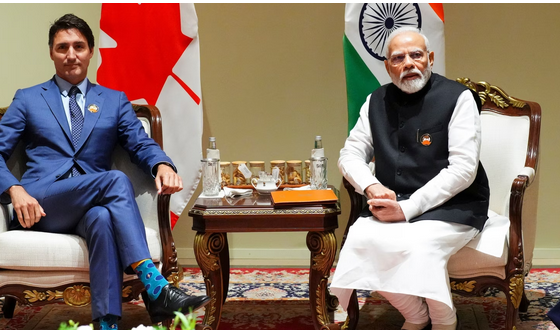Free-fall : On the Canada-India diplomatic row and the way-out
India must cooperate on the Nijjar case if Canada provides evidence
India and Canada took their diplomatic row over the killing of Canadian Khalistani activist Hardeep Singh Nijjar into the rink at the UN General Assembly this week. External Affairs Minister S. Jaishankar warned that the response to “terrorism, extremism and violence” should not be determined by “political convenience ”, in what seemed to be a reference to India’s concerns over Khalistani extremism in Canada. He added that countries must not “ cherry pick ” when to respect “ territorial integrity and non-interference in internal affairs” — a clear reference to Canada’s allegations that Indian “government agents” were responsible for the Nijjar killing in Surrey in June. Canadian UN Ambassador Robert Rae appeared to double down on the Canadian allegations, as he spoke about the “ extent to which democracies are under threat” due to foreign interference . In effect the statements reflected the impasse between both countries more than 10 days since Canadian Prime Minister Justin Trudeau made his claims in the Canadian Parliament. After expelling each other’s diplomats , India and Canada have curtailed people-to-people ties. While India has suspended all visas to Canadians, Canada has put trade talks on hold . These actions have been taken even before Canada has made any evidence of its allegations against India public, and New Delhi has reiterated that despite two visits by the Canadian National Security Adviser to discuss the Nijjar issue, no concrete evidence has been provided. Nor has Canada completed its own investigation or begun any trial. Despite this, there have been calls from Canadian “Five Eyes” allies that India must cooperate, indicating some pressure from Canada.
The only way out is for Canada to take the first step in proving its allegations, which, in the absence of verifiable evidence, seem to have been levelled prematurely . Mr. Jaishankar has made it clear that such judicial inter-state killings are not the policy of the Indian government. However, it is hard to believe that the leader of one of the most developed countries would make these claims without sufficient cause , and if evidence is shared, the next logical step would be for New Delhi, which has denied the allegations strenuously , to cooperate on any information needed to conclude the Canadian investigation. India’s grievances against Canada for “ soft-peddling ” the issue of Khalistan extremism and providing “ safe havens ” for wanted terrorists, as well as Canadian claims of rights violations by security forces in Punjab, and Indian intelligence operations in Canada, date back to the 1980s, and these were the cause of their high-level engagements being frozen for decades . However, never before have trade, travel and tourism ties been cut down so quickly as in the past week. With students, the business community, and the diaspora feeling the brunt , it is hoped the two countries move with some urgency to arrest the free fall in ties.
